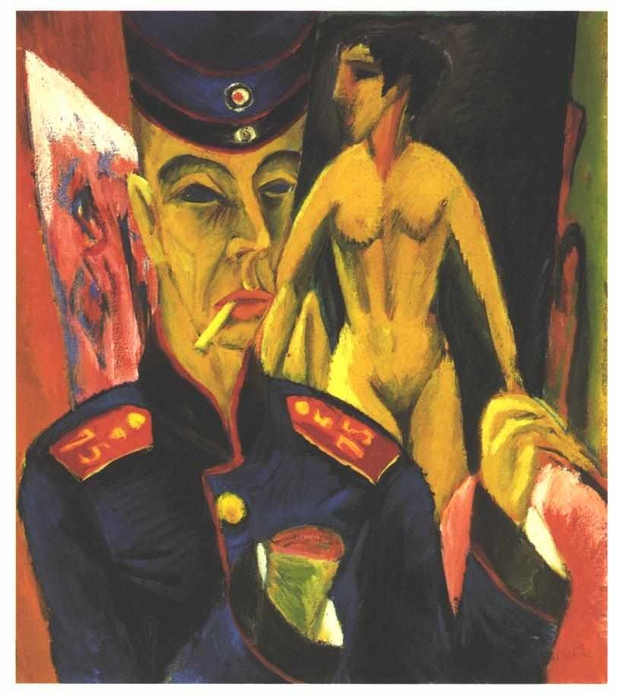
I sit in one of the dives
On Fifty-second Street
Uncertain and afraid
As the clever hopes expire
Of a low dishonest decade:
Waves of anger and fear
Circulate over the bright
And darkened lands of the earth,
Obsessing our private lives;
The unmentionable odour of death
Offends the September night.
…
All I have is a voice
To undo the folded lie,
The romantic lie in the brain
Of the sensual man-in-the-street
And the lie of Authority
Whose buildings grope the sky:
There is no such thing as the State
And no one exists alone;
Hunger allows no choice
To the citizen or the police;
We must love one another or die.
Defenceless under the night
Our world in stupor lies;
Yet, dotted everywhere,
Ironic points of light
Flash out wherever the Just
Exchange their messages:
May I, composed like them
Of Eros and of dust,
Beleaguered by the same
Negation and despair,
Show an affirming flame.
Read the entire poem here
—Wystan Hugh Auden, September 1, 1939 (excerpt) first published in The New Republic, Oct. 18, 1939.
Listen to a reading of the poem by Dylan Thomas:
)
This poem achieved great resonance after the events of September 11, 2001—it was widely reproduced, recited on NPR, and interpreted with a link to the tragic events of that day. Indeed, it starts in Manhattan, “in one of the dives on Fifty-second Street,” which Auden later clarified: the Dizzy Club, 62 West 52nd Street (the premises are now occupied by a Beefsteak Charlie’s, I checked). But it captures Auden’s reaction to another tragedy, namely the outbreak of World War II. The poem expresses anger and sadness towards those events, and it questions the historical and mass psychological process that led to the war. In fact, it focuses on the political psychosis of the German people, echoing a few lines of Nietzsche (“Accurate scholarship can / Unearth the whole offence / From Luther until now / That has driven a culture mad”). It then turns to the effect that this war will have on the world and its people, again with psychological overtones. While most of the poem seems thus a chronological bookmark, the last two stanzas—reproduced here–emerge like light from a break in the clouds. They seem to assert defiance in the face of the descending mentality of war. The language is surprisingly naïve but also very moving, and one line, “We must love one another or die” has become a badge for Auden.
It’s curious that Auden felt embarrassed by this poem (he made Penguin include a note saying that it was “trash he was ashamed to have written”) and sought to suppress its inclusion in his later collected works. Perhaps he was concerned about the simplicity and frankness of thought, the somewhat amateurish psychologizing. But the noble note on which the poem ends, its defiant affirmation of love and sympathy in a time of boiling hatred, merits reading, particularly when the troubles and burdens of the world threaten to crush us.
Listen to Benjamin Britten’s Lachrymae: Reflections on a Song of John Dowland (1950) in a performance by the European Camerata. Britten has constructed an entirely instrumental dialogue with one of the most celebrated songs of the Elizabethan era, “Flow My Tears” (1596). He occludes and obstructs the instrumental text in a sort of mock dialogue. The quotation of music is set to this text: “Flow, my tears, fall from your springs! / Exiled for ever, let me mourn; / Where night’s black bird her sad infamy sings, / There let me live forlorn.” A performance of the Dowland song by Andreas Scholl follows.



